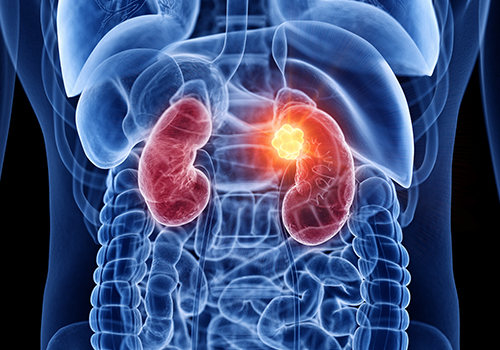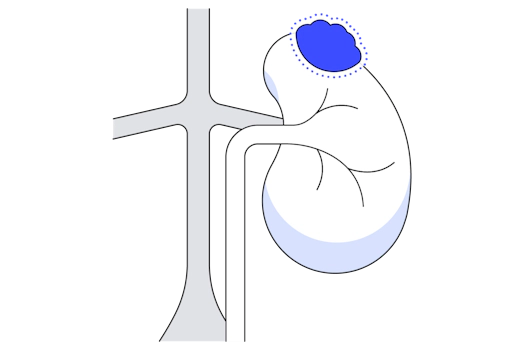Kidney Cancer

Overview
Kidney cancer, also known as renal cell carcinoma (RCC), is a type of cancer that originates in the kidneys. At Rutgers Urology, we specialize in the diagnosis and treatment of kidney cancer, utilizing advanced techniques to ensure precise and effective care. Here are some of the advanced services we offer:
1. Image-Guided Biopsy
What is Image-Guided Biopsy? Image-guided biopsy is a minimally invasive procedure that allows us to obtain tissue samples from the kidney for examination. This diagnostic tool involves using advanced imaging techniques, such as CT scans or ultrasound, to guide the biopsy needle accurately.
Procedure: During the procedure, the patient is positioned for optimal imaging. The biopsy needle is guided to the targeted area using real-time imaging. Tissue samples are collected for analysis. Purpose Image-guided biopsy is essential for confirming the diagnosis of kidney cancer and determining its specific characteristics.
Preparation: Patients may need to avoid food or drink for a few hours before the procedure. Consultation with our medical team will provide specific preparation instructions.
2. Single-Port Robotic Surgery
Overview: Single-port robotic surgery is an advanced and minimally invasive approach to treating kidney cancer. This procedure is performed through a single small incision, reducing scarring, and expediting recovery.
Procedure: The surgeon controls a robotic system to perform precise movements through a single incision. The affected kidney or tumor is removed with minimal disruption to surrounding tissues.
Benefits:
Reduced scarring
Shorter recovery times
Enhanced precision in surgery
Patient Experience: Patients undergoing single-port robotic surgery often experience quicker recovery and less discomfort compared to traditional surgery.
3. Multi-Port Robotic Surgery
Overview: Multi-port robotic surgery offers an alternative or complementary approach to single-port surgery, allowing for increased flexibility in complex cases.
Procedure: Multiple small incisions are made to accommodate robotic instruments. The surgeon controls the robotic system to perform intricate movements.
Comparison: While single-port surgery minimizes scarring, multi-port robotic surgery may be preferred for certain cases requiring additional maneuverability. The incisions are still very small. Scarring and pain are minimal and recovery times are comparable to single-port robotic surgery.
Partial and Radical Nephrectomy. When is one preferred over another?
Partial nephrectomy and radical nephrectomy are surgical procedures used to treat kidney cancer. Here’s a brief explanation of each:

Partial Nephrectomy
Overview: Also known as nephron-sparing surgery or kidney-sparing surgery, a partial nephrectomy involves the removal of only the cancerous or diseased part of the kidney while preserving the healthy surrounding tissue.
Procedure: During a partial nephrectomy, the surgeon removes the tumor and a small margin of healthy tissue around it, sparing the rest of the kidney.
Indications: This approach is often preferred when the tumor is small, the patient has only one kidney, or preserving kidney function is crucial.

Radical Nephrectomy
Overview: Radical nephrectomy involves the complete removal of the entire affected kidney, including the tumor and surrounding tissue.
Procedure: In a radical nephrectomy, the surgeon removes the entire kidney, possibly the adrenal gland, nearby lymph nodes, and sometimes additional surrounding tissues if necessary.
Indications: This procedure is typically recommended when the tumor is large, located in a specific part of the kidney, or there is a need to address more extensive disease.
Considerations
Partial nephrectomy is associated with a lower risk of long-term kidney problems and is often preferred when feasible to preserve overall kidney function. Radical nephrectomy may be necessary in cases where preserving kidney function is less critical, and the goal is to ensure complete removal of the cancer.
The choice between partial and radical nephrectomy depends on various factors, including the size and location of the tumor, the patient’s overall health, and the potential impact on kidney function. The decision is often made collaboratively between the patient and the medical team based on a thorough evaluation of the individual case. Both procedures aim to effectively treat kidney cancer while minimizing the impact on the patient’s overall health and kidney function.
4. Genetic Counseling
Explanation: Genetic counseling plays a crucial role in understanding the genetic factors associated with certain types of kidney cancer.
Benefits:
Identifying hereditary factors
Understanding the genetic basis of kidney cancer
Process: Patients undergo counseling sessions to discuss family history, genetic testing options, and potential implications for treatment and prevention.
Contact Us
For more information on our approach to diagnosing and treating kidney cancer, or to schedule a consultation, please contact us today.
